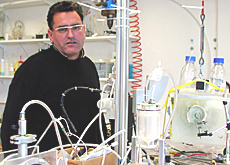Swiss foundation rewards young entrepreneurs

Three entrepreneurs found themselves SFr100,000 ($80,000) richer last week when they became the latest recipients of a Swiss foundation’s annual prize for innovation.
To mark the occasion, the vice-president of the De Vigier Foundation spoke to swissinfo about the need for more entrepreneurship and risk-taking in Switzerland.
Jean-Claude Strebel heads up the board of the foundation that was established 16 years ago to help young Swiss set up in business.
It is his task to sift through the applications and help select those candidates who have both an innovative idea and an intuitive sense of how to go about marketing their product.
This year’s winners include a Geneva-based doctor who has invented a new rapid detection system for stroke victims, and a chemist from Bern who has developed a device that can check for faulty fire detectors (see video).
The De Vigier Foundation was set up in 1987 by William de Vigier, a prominent Swiss businessman who made his fortune in London. He died last December aged 93.
Strebel says the foundation’s work will go on, because Switzerland still lags behind many other countries when it comes to encouraging young people to take the risk of setting up in business on their own.
swissinfo: This year’s winners have come up with very different ideas to make money. But is there anything that binds them together?
Jean-Claude Strebel: What all our winners have in common is a determination to get new products on the market. Our foundation does not exist just to hand out prizes for innovative products. We aim to reward the young people behind the ideas. All our winners are people who have shown that they are willing to create a new company from nothing.
swissinfo: Your foundation has been helping young entrepreneurs to set up on their own for nearly two decades. You must have had your fair share of successes and failures.
J-C.S.: We have had some bankruptcies, but 31 of the 42 start-ups we have helped are still in business. One-third of these are very successful and making a good profit, while another third have a real chance of breaking even. Ten companies are fighting to survive.
Compare this with Switzerland as a whole, where you’ll find that 50 per cent of all projects started by young entrepreneurs with no prior experience disappear after just two years. Half of the rest are gone after four years, and after ten years you are left with just ten per cent. So, on average, only ten out of every 100 start-ups are still in business after ten years.
swissinfo: Do you have a sense that young people in Switzerland are unwilling to take the risk of starting up their own companies?
J-C.S.: Traditionally we have not been very successful in encouraging entrepreneurship, because young Swiss tend to be very spoilt. Once they have finished studying they can go on to get well-paid jobs in large companies and do not even consider the possibility of setting up their own company.
But things are slowly changing: Thanks to places like the Federal Institutes of Technology in Zurich and Lausanne, we are seeing more and more young people who want to finish their studies and then take the ideas they come up with to the market.
swissinfo: Can Switzerland learn from other countries about how to foster a spirit of entrepreneurship?
J-C.S.: We can certainly look to countries like Britain and the United States, where there are many more young graduates who are prepared go their own way with their own companies. The people there are far more dynamic than here in Switzerland. But there are now encouraging signs that more young Swiss are ready to take the plunge and try to make a success of starting out on their own.
swissinfo: What has held back entrepreneurship in Switzerland?
J-C.S.: It’s a combination of three factors. Firstly, Switzerland has plenty of money but not enough venture capitalists who are prepared to invest in new companies. Secondly, young people are not keen to work 14-hour days running their own businesses.
The third factor has to do with the perception in Switzerland that it is shameful to go bankrupt. In the US, you see very successful people who have been through two or three bankruptcies and have learnt from the experience. So I hope that people here will realise that it is no bad thing to try something – even if you ultimately fail to achieve what you set out to do.
swissinfo-interview: Ramsey Zarifeh
The De Vigier Foundation was established 16 years ago to help young entrepreneurs set up in business on their own.
A maximum of five awards of SFr100,000 ($80,000) are handed out each year.
The foundation was set up in 1987 by William de Vigier, a prominent Swiss businessman who died last year aged 93.

In compliance with the JTI standards
More: SWI swissinfo.ch certified by the Journalism Trust Initiative



You can find an overview of ongoing debates with our journalists here . Please join us!
If you want to start a conversation about a topic raised in this article or want to report factual errors, email us at english@swissinfo.ch.